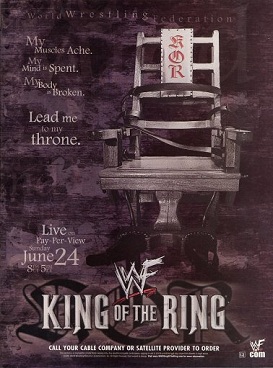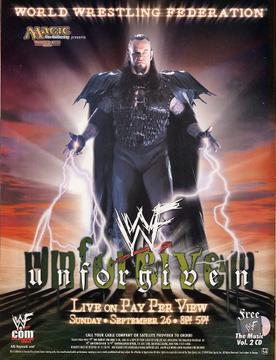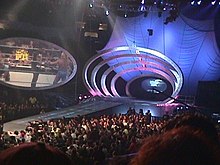
WWE SmackDown, also known as Friday Night SmackDown or simply SmackDown, is an American professional wrestling television program produced by WWE. It airs live every Friday at 8 p.m. Eastern Time (ET) on USA Network in the United States, and in most international markets on Netflix.

Paul Donald Wight II is an American professional wrestler and actor. He is signed to All Elite Wrestling (AEW), as a wrestler and was a commentator for its web television show, AEW Dark: Elevation, under his real name of Paul Wight. He is best known for his tenure with World Championship Wrestling (WCW) from 1995 to 1999 as The Giant and his tenure with the World Wrestling Federation from 1999 to 2021 under the ring name (The) Big Show.

Howard Finkel was an American professional wrestling ring announcer, backstage worker, and occasional professional wrestler, best known for his appearances in WWE. He began working for Vincent J. McMahon's World Wide Wrestling Federation (WWWF) in 1975, and was a Madison Square Garden ring announcer since 1977. Finkel was WWE's longest-serving employee and was widely regarded as the greatest ring announcer of all time. He was inducted into the WWE Hall of Fame in 2009.

The Invasion was a professional wrestling storyline in the World Wrestling Federation during the Attitude Era that ran from March to November 2001 and involved stables of wrestlers purporting to represent World Championship Wrestling (WCW) and Extreme Championship Wrestling (ECW)—which merged to form The Alliance—placed against a stable of wrestlers purporting to represent the WWF. The storyline began shortly after the WWF's acquisition of WCW in March 2001, and concluded with a "winner takes all" match between The Alliance and the WWF at Survivor Series.

Tony Chimel is an American former professional wrestling ring announcer. He is signed to All Elite Wrestling (AEW), where he works as a producer. He is best known for his time with WWE.

The 1999 SummerSlam was the 12th annual SummerSlam professional wrestling pay-per-view (PPV) event produced by the World Wrestling Federation. It took place on August 22, 1999, at the Target Center in Minneapolis, Minnesota. Nine matches were contested at the event.

The 2000 SummerSlam was the 13th annual SummerSlam professional wrestling pay-per-view (PPV) event produced by the World Wrestling Federation. It took place on August 27, 2000, at the Raleigh Entertainment and Sports Arena in Raleigh, North Carolina. Ten matches were contested at the event.

The 2002 Royal Rumble was the 15th annual Royal Rumble professional wrestling pay-per-view (PPV) event produced by the World Wrestling Federation. It took place on January 20, 2002, at the Philips Arena in Atlanta, Georgia. It was the final Royal Rumble event produced under the WWF name, as in May, the WWF was renamed to World Wrestling Entertainment (WWE). It was also the final Royal Rumble held before the introduction of the first brand extension in March. Six matches were contested at the event.

The 2001 Royal Rumble was the 14th annual Royal Rumble professional wrestling pay-per-view (PPV) event produced by the World Wrestling Federation. It took place on January 21, 2001, at the New Orleans Arena in New Orleans, Louisiana. Six matches were contested, including one match for the Sunday Night Heat pre-show.

The 2000 Royal Rumble was the 13th annual Royal Rumble professional wrestling pay-per-view (PPV) event and 100th PPV overall produced by the World Wrestling Federation. It took place on January 23, 2000, at Madison Square Garden in New York City, New York. Six matches were contested on the event's card.

The 1999 Survivor Series was the 13th annual Survivor Series professional wrestling pay-per-view (PPV) event produced by the World Wrestling Federation. It took place on November 14, 1999, at the Joe Louis Arena in Detroit, Michigan. It was the second Survivor Series held at the Joe Louis Arena after the 1991 event.

The Attitude Era was a major era of professional wrestling within the World Wrestling Federation. The term "WWF Attitude" was used to describe its programming from November 9, 1997, to May 6, 2002. It began during the Monday Night War, a period in which WWF's Monday Night Raw went head-to-head with World Championship Wrestling's (WCW) Monday Nitro in a battle for Nielsen ratings each week from September 4, 1995, to March 26, 2001. The era officially started on November 9, 1997, at Survivor Series 1997, when a video package aired ending with the first use of the "WWF Attitude" scratch logo. This was immediately before the main event featuring Bret Hart vs. Shawn Michaels, which retrospectively would be known as the Montreal Screwjob due to the match's controversial finish, marking the end of the New Generation Era. WWF's programming in the Attitude Era featured adult-oriented content, which included increased depicted violence, profanity, and sexual content. This era was part of a wider surge in the popularity of professional wrestling in the United States and Canada as television ratings and pay-per-view buy rates for the WWF and its rival promotions saw record highs.

The 2002 Unforgiven was the fifth annual Unforgiven professional wrestling pay-per-view (PPV) event produced by World Wrestling Entertainment (WWE). It was held for wrestlers from the promotion's Raw and SmackDown! brand divisions. The event took place on September 22, 2002, at Staples Center in Los Angeles, California. It was the first Unforgiven held under the WWE name, after the promotion was renamed from World Wrestling Federation (WWF) to WWE earlier that year in May, as well as the first Unforgiven held during the first brand extension that began in March.

The 2002 Backlash was the fourth Backlash professional wrestling pay-per-view (PPV) event produced by the World Wrestling Federation. It was held for wrestlers from the promotion's Raw and SmackDown! brand divisions. The event took place on April 21, 2002, at Kemper Arena in Kansas City, Missouri—it was the first PPV event to be held at Kemper Arena since Over the Edge in May 1999, in which Owen Hart, competing as The Blue Blazer, died after falling 78 feet from a harness to the ring. It was the company's first PPV held following the introduction of the brand split. It was the fourth consecutive Backlash presented by Castrol GTX and the final Backlash held under the WWF name as the promotion was renamed to World Wrestling Entertainment (WWE) the following month. The concept of the pay-per-view was based around the backlash from WrestleMania X8.

The 2002 Judgment Day was the fourth Judgment Day professional wrestling pay-per-view (PPV) event produced by World Wrestling Entertainment (WWE). It was held for wrestlers from the promotion's Raw and SmackDown! brand divisions. It took place on May 19, 2002, at the Gaylord Entertainment Center in Nashville, Tennessee. This event was the promotion's first pay-per-view held under the WWE name after the change from its previous name, World Wrestling Federation (WWF), two weeks prior to the event, although promotional materials produced before May 10, 2002, still bore the WWF logo.

The 2001 King of the Ring was the ninth annual King of the Ring professional wrestling pay-per-view (PPV) event produced by the World Wrestling Federation that featured the 15th King of the Ring tournament. It was the final King of the Ring PPV and tournament held under the WWF name as the promotion was renamed to World Wrestling Entertainment (WWE) in May 2002, thus the Last King Of The Ring of the Attitude Era. The event took place on June 24, 2001, at the Continental Airlines Arena in East Rutherford, New Jersey. The main event was a Triple threat match, a match involving three competitors, for the WWF Championship. Stone Cold Steve Austin defeated Chris Benoit and Chris Jericho to retain the title. The undercard featured the 2001 King of the Ring tournament, which was won by Edge.

The 1999 Unforgiven was the second annual Unforgiven professional wrestling pay-per-view (PPV) event produced by the World Wrestling Federation. It took place on September 26, 1999, at the Charlotte Coliseum in Charlotte, North Carolina. Although the event was the second Unforgiven PPV held, it was the first Unforgiven not held under the In Your House series, which had been discontinued in February 1999.

The 2001 Unforgiven was the fourth annual Unforgiven professional wrestling pay-per-view (PPV) event produced by the World Wrestling Federation. It took place on September 23, 2001, at the Mellon Arena in Pittsburgh, Pennsylvania. It was the final Unforgiven event held under the WWF name as the promotion was renamed to World Wrestling Entertainment (WWE) in May 2002. It was also the last Unforgiven held before the introduction of the brand extension in March 2002.

The 1999 Armageddon was the inaugural Armageddon professional wrestling pay-per-view (PPV) event produced by the World Wrestling Federation. It took place on December 12, 1999, at the National Car Rental Center in Sunrise, a suburb of Fort Lauderdale, Florida.

The history of WWF/E SmackDown, began with the show's debut on August 26, 1999, in Kansas City, Missouri. The show was originally broadcast on Thursday nights but moved to Friday on September 9, 2005, before returning to Thursdays on January 15, 2015. On July 19, 2016, it was moved to Tuesday Nights. SmackDown! debuted in the United States on the UPN television network on April 29, 1999, but after the merger of UPN and the WB, SmackDown! began airing on The CW in September 2006. The show was moved to MyNetworkTV in October 2008, to Syfy on October 1, 2010 and to USA Network on January 7, 2016.




















